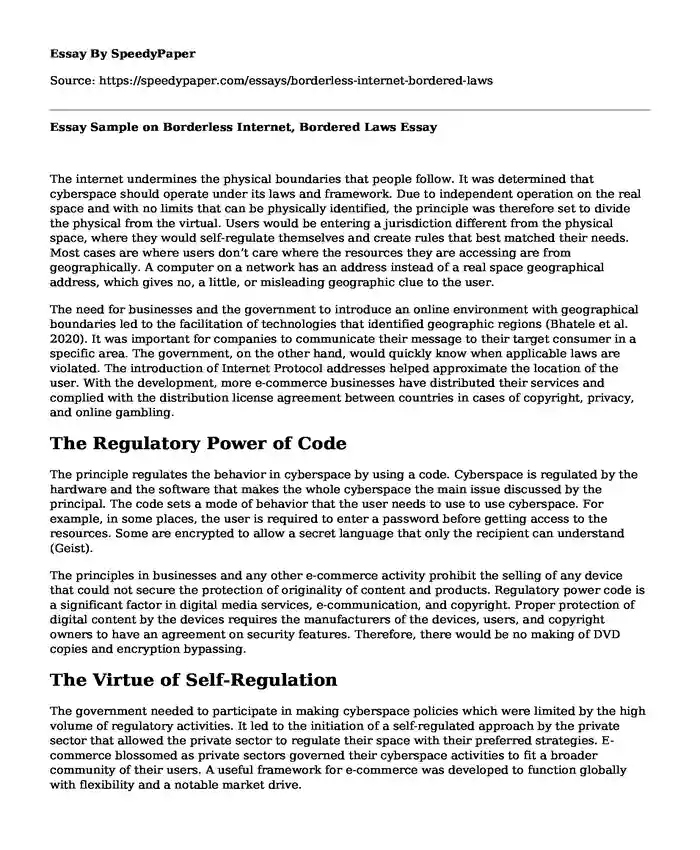
| Type of paper: | Essay |
| Categories: | Law International relations Internet Cyber security |
| Pages: | 3 |
| Wordcount: | 707 words |
The internet undermines the physical boundaries that people follow. It was determined that cyberspace should operate under its laws and framework. Due to independent operation on the real space and with no limits that can be physically identified, the principle was therefore set to divide the physical from the virtual. Users would be entering a jurisdiction different from the physical space, where they would self-regulate themselves and create rules that best matched their needs. Most cases are where users don’t care where the resources they are accessing are from geographically. A computer on a network has an address instead of a real space geographical address, which gives no, a little, or misleading geographic clue to the user.
The need for businesses and the government to introduce an online environment with geographical boundaries led to the facilitation of technologies that identified geographic regions (Bhatele et al. 2020). It was important for companies to communicate their message to their target consumer in a specific area. The government, on the other hand, would quickly know when applicable laws are violated. The introduction of Internet Protocol addresses helped approximate the location of the user. With the development, more e-commerce businesses have distributed their services and complied with the distribution license agreement between countries in cases of copyright, privacy, and online gambling.
The Regulatory Power of Code
The principle regulates the behavior in cyberspace by using a code. Cyberspace is regulated by the hardware and the software that makes the whole cyberspace the main issue discussed by the principal. The code sets a mode of behavior that the user needs to use to use cyberspace. For example, in some places, the user is required to enter a password before getting access to the resources. Some are encrypted to allow a secret language that only the recipient can understand (Geist).
The principles in businesses and any other e-commerce activity prohibit the selling of any device that could not secure the protection of originality of content and products. Regulatory power code is a significant factor in digital media services, e-communication, and copyright. Proper protection of digital content by the devices requires the manufacturers of the devices, users, and copyright owners to have an agreement on security features. Therefore, there would be no making of DVD copies and encryption bypassing.
The Virtue of Self-Regulation
The government needed to participate in making cyberspace policies which were limited by the high volume of regulatory activities. It led to the initiation of a self-regulated approach by the private sector that allowed the private sector to regulate their space with their preferred strategies. E-commerce blossomed as private sectors governed their cyberspace activities to fit a broader community of their users. A useful framework for e-commerce was developed to function globally with flexibility and a notable market drive.
The government has established policies that affect all e-commerce activities to ensure openness in transactions and the implementation of business ethics between the consumer and the seller. Protective measures on spam emailing were put in place while transparency in credit card online sales enhanced (Geist). The buyer could, therefore, be able to cancel a purchase if the seller fails to meet the deadline for delivery. It led to the creation of a reliable online business.
Shopper Marketing Case Analysis
Smart Store is a retail industry that trades household consumer products. The business employs online marketing strategies that include shopper marketing through WiFi (Ngo & Jaishankar, 2017). On March 18, 2019, Smart Store was sued by a customer for using his discount card and purchasing history to send him promotion messages without his consent. The company incurred fines for breaching internet privacy laws. The company will now be consistent in observing cyber law principles such as observing customer’s autonomy and publicity guidelines to avoid such cases.
References
Bhatele, K. R. R., Mishra, D. D., Bhatt, H., & Das, K. (2020). The Fundamentals of Digital Forensics and Cyber Law. In Cyber Warfare and Terrorism: Concepts, Methodologies, Tools, and Applications (pp. 64-81). IGI Global. http://www.mecs-press.org/ijcnis/ijcnis-v11-n1/IJCNIS-V11-N1-6.pdf
Geist. M. Cyber 2.0.GC. https://www.bc.edu/content/dam/files/schools/law/lawreviews/journals/bclawr/44_2/03_TXT.htm. Retrieved on June 19, 2020.
Ngo, F., & Jaishankar, K. (2017). Commemorating a Decade in Existence of the International Journal of Cyber Criminology: A Research Agenda to Advance the Scholarship on Cyber Crime. International Journal of Cyber Criminology, 11(1).
Cite this page
Essay Sample on Borderless Internet, Bordered Laws. (2023, Sep 08). Retrieved from https://speedypaper.com/essays/borderless-internet-bordered-laws
Request Removal
If you are the original author of this essay and no longer wish to have it published on the SpeedyPaper website, please click below to request its removal:
- Learn the Sony BMG CD Copy Prevention Scandal in Free Essay Sample
- Common Forms of Cyber Attacks - Free Essay in Cyber Security
- Essay Example on Protecting Critical Information Infrastructures
- Free Essay Sample on IT Project Management
- Essay Example: Questioning Straightforward Corporeality and Penetration
- Free Essay. Make a Self-Assessment
- Free Paper Example on Cyber Grooming
Popular categories




